Neonicotinoids insecticides hit the headlines because their use for controlling cabbage stem flea beetle in crops of rapeseed and the suspected links to declining numbers of honeybees and native bumble bees. At Farrington’s we have more questions from our valued customers about this, than any other topic. Before I go any further, just to confirm we are growing bee friendly rapeseed, we do not use Neonicotinoids in growing our rapeseed and do not intend to if the ban is lifted.
How we grow our crops and look after the wider environment has always been my top priority at Bottom Farm. Indeed, I joined LEAF (Linking Environment and Farming) back in 1997 to learn more about doing the right thing in this area.
Why is Cabbage Stem Flea Beetle such a problem?
Rapeseed plants grow from the tiny little black seeds planted at the end of August each year. The first few weeks are vital in the survival of the crop, which requires a warm, moist soil to help it germinate and tentatively put its head above the surface, from which the tender young plants start to grow. However, these young tender plants are delicious to a number of predators including flea beetles. So much so that if the conditions are right for flea beetles, they can completely wipe out a crop overnight. After which it is often too late to replant a second crop of rapeseed, as the soil temperature has dropped below the minimum required for the plant to grow.
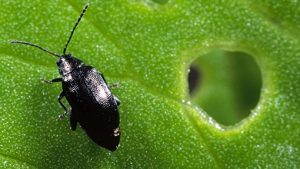
What is a Neonicotinoid?
Neonicotinoids are a group of insecticides based on nicotine. In rapeseed, the chemical is coated in tiny amounts onto the seed to be planted and moves (is translocated) into the growing plant as it emerges from the soil. When a flea beetle nibbles on said plant, there is just enough of the toxic chemical to kill the pest. But otherwise, it is a specifically targeted use of an insecticide in an ingenious way.
Concerns grew that numbers of both honey bees and bumble bees were declining, so scientists explored the potential causes. It appears there are several possible causes including; loss of habitat for bees to feed on and live in; potential pests and diseases affecting bees, such as Varroa mite; changing weather patterns, such as cool damp springs; use of agricultural pesticides.
Some research suggested that small amounts of Neonicotinoid translocated through to the pollen and nectar in the flowering rapeseed plants. When bees visited these flowers they were inadvertently ingesting the chemical which was causing them to lose their bearings; a bit like us trying to find our way home after having too much of a good night in the pub. Other research suggested longer term damage to the fertility of the bee colony.
Although research appeared inconclusive with the debate on both sides being passionate, the EU restricted the use of Neonicotinoids on rapeseed crops from 2013, until such time that more conclusive evidence is shown.
Growing Bee Friendly Rapeseed.
I use several approaches to try and grow a successful crop of rapeseed whilst looking after our bee populations.
– I use a crop rotation and have extended the rapeseed from one in 3 years, to one in 4 to 5 years. This will provide a bigger gap between the crop so as there is less food around for the flea beetle to live off, that will hopefully in time reduce the risk of attack.
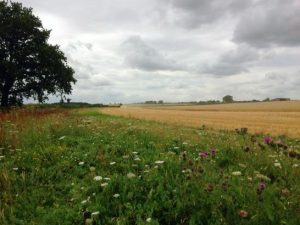
– Established wildflower meadow areas around the farm to create a perfect habitat with a variety of pollinating plants for bees and other beneficial insects to live off.
– Planting the crop into fertile soil, with the use of a healthy crop rotation which includes nutrient building cover crops to give the rapeseed the best possible chance to grow quickly out of the danger period when it is susceptible to flea beetle damage. This is backed up with a small amount of fertiliser if required.
– A local beekeeper has hives on the farm. The bees help fertilise our rapeseed and other crops, making delicious honey in the process.
– I am experimenting by growing companion crops of vetch and clover within the rapeseed. These create a friable soil structure and add nutrition to help the rapeseed plant grow well. It may also confuse a passing flea beetle as to what crop is actually growing in the field and may pass by unaware that their favourite meal is below them.
– As a final resort, we use an insecticide as found in head lice shampoo to kill bad infestations of flea beetle. If we use this, we make sure we spray the crop early in the morning or late at night, as the flea beetle will still be feeding on the crop, but the bees are all tucked up in bed.
In Summary, this hopefully explains some of the conundrums I have as a farmer in trying to do the best thing. Hopefully also, as I write in December 2016, with a temperature of -4.5°C this morning, I am confident that nature will help us enormously in reducing the number of flea beetles surviving the winter.
Nigella Loves ……….
Yes it’s true; Nigella loves Mellow Yellow cold pressed rapeseed oil, and is telling everyone about in her latest book Nigella Christmas and on her website www.nigella.com . We are delighted to have such a wonderful endorsement from someone who obviously has great taste.
Price reduction on FARRINGTON’S MELLOW YELLOW DRESSINGS! Now that we are producing our award winning dressings completely in-house, we are able to make savings on our costs, which we would like to pass on. We have reduced the trade price of the dressings to around £2.44 per bottle, with an rrp of around £3.25. These new prices represent a 7% reduction, and take effect immediately. Please contact your usual wholesale supplier or us directly to place orders.
Show Time….
The year is young, but Duncan is already thinking of the trade shows coming up, with the first being Scotland’s Speciality Food Show from 25th to 27th January at the SECC in Glasgow. He is greatly looking forward to talking to our many loyal customers north of the border. We will also be attending IFE09 at EXCEL in London from 15th to 18th March, where we will be launching our latest dressing.
New Dressing…
To join our successful Blackberry Vinegar and Honey & Mustard Dressings, we are working on the latest FARRINGTON’S MELLOW YELLOW CLASSIC VINAIGRETTE which will be launched at IFE09. As with the existing dressings, it tastes superb, and will be made using the finest additive free ingredients – we are hoping to have some samples ready for a sneak preview at the Scottish show.
New Irish wholesale supplier….
Following the success of the SHOP08 show, we are hoping to take on a new supplier for Ireland in the next few days. Berryhill Merchants have a fantastic reputation in the Irish speciality food area, and we greatly look forward to welcoming them on board.
Further Information
For orders and further information, please do contact us on 01933 622809 or by email info@farrington-oils.co.uk ; or one of our brilliant wholesale suppliers, who are always happy to hear from you:
Berryhill Merchants Ltd (Ireland); Hider Food Imports; Goodness Foods; Michael Bance (Leicestershire), Richards Catering Supplies (Cornwall), T & J Fine Foods (Lincolnshire).

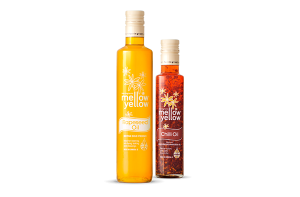 Oils
Oils Rapeseed Oil
Rapeseed Oil Chili Oil
Chili Oil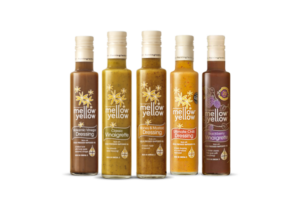 Dressings
Dressings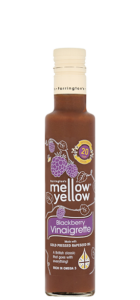 Blackberry Vinaigrette
Blackberry Vinaigrette Classic Vinaigrette
Classic Vinaigrette Balsamic Dressing
Balsamic Dressing Honey & Mustard
Honey & Mustard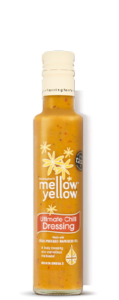 Ultimate Chilli Dressing
Ultimate Chilli Dressing